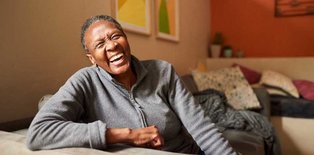Keep That Spring in Your Step Despite the Time Change

The arrival of Daylight Savings Time (DST) gives us more daylight! But along with that is the time change.
We all have a body clock, known as our circadian rhythm. Daylight triggers it. So, when we change from Eastern Standard to DST, our internal clock gets out of whack, forcing us to adjust.
If you’re a person who already struggles with getting a good night’s rest, that can make matters worse – at least for a few days.
How to adjust to Daylight Savings Time
One way to cope is to start making the shift a few days before, so that you won’t be quite so draggy and grumpy on Monday morning. Go to bed 30 minutes to an hour earlier than usual on Thursday and Friday. This way when you reset the clocks before bed on Saturday, you’ll already have begun the transition.
Tips for a good night's sleep any time of year
There are steps you can take to create conditions that boost your chances of falling and staying asleep, as well as sleeping soundly.
- Have a nightly routine to wind down before bedtime. Wash up, brush your teeth, put on your pajamas. Do everything in the same order, and do it every night. This programs your brain to enter “shutdown mode.”
- Your bedroom should be a calm, restful area – not a place for conflicts with your bed partner. Work on a compromise about room temperature, blankets, or fans you both can live with.
- Switch to caffeine-free beverages after noontime.
- Take a look at your daily medications. There are some that can disturb your sleep if you take them at the wrong time. Check with your physician or pharmacist about when to take your dose.
What about naps?
Taking a routine nap as an adult will disturb your sleep cycle at night, so it’s best avoided.
Of course, this rule doesn’t apply to people who work a 24-hour shift, such as firefighters. Older people, who often get fewer hours of sleep that typically is not as deep, may need an afternoon nap. This is especially true if they are awakened at night by aches and pains or a need to urinate.
But do take a brief nap if you feel you would be unsafe to drive because of drowsiness.
What to do when you can’t sleep
One of the worst things you can do if you can’t sleep is to stay in bed and toss and turn. Wait for 10 minutes, and if you haven’t fallen back asleep, get out of bed and do something restful, like reading a few pages of a book or meditating. Do not pick up your tablet or smartphone; you want to avoid screens, though some people do find watching a little television makes them sleepy.
Whatever you choose, you need to not be in bed when you do that activity, because it’s important to associate being in bed with sleeping. When you get drowsy, go back to bed. If you don’t fall asleep in 10 minutes, get up and repeat the routine until you succeed.
Over-the-counter or prescription sleep aids can help some people in the short term. Be sure to talk to your doctor before taking any sleep aids.
For more tips on managing your sleep and other healthy lifestyle changes, visit the Lifespan Living blog.
About the Author:
Coastal Medical Primary Care Team
Coastal Medical Primary Care Team provides crucial services for your long-term health and well-being at several locations in Rhode Island.
Lifespan Living Newsletter
Find a Doctor

The right provider is in our network
Search more than 1,200 providers in our network.



